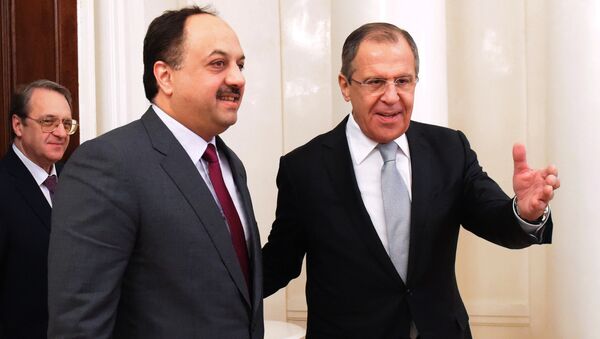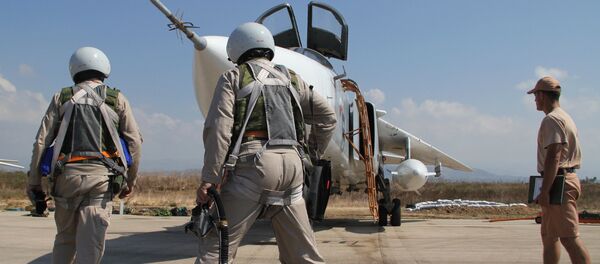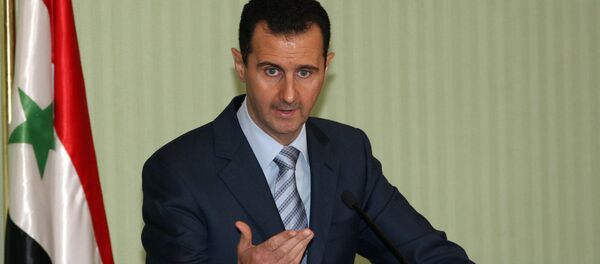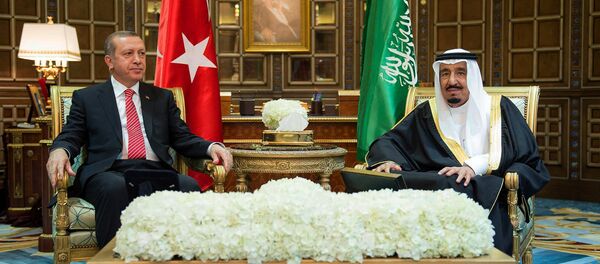Friday's visit to Moscow by Qatari Foreign Minister Khalid bin Mohammad Attiyah had a friendly and cordial tone about it, Foreign Minister Lavrov emphasizing at its conclusion that Moscow plans to continue holding a regular political dialogue with Doha.
In the course of their meeting for the cameras, the foreign ministers said that they were in agreement on issues ranging from the need to expand bilateral economic and trade ties, to the possibility of holding consultations on efforts to stabilize global energy prices. At the meeting, Lavrov also said that Moscow and Doha share "very, very similar" views on the need to boost security in the Persian Gulf region.
Still, the meeting wasn't all peaches. Taking a shot at Syrian Bashar Assad, Moscow's ally in the fight against Daesh (ISIL/ISIS) terrorism, Attiyah reiterated Qatar's position that the Syrian president "is one of the main sponsors of terror." Accusing Assad of using chemical weapons, the Qatari foreign minister stated that "he will never have a role in Syria's future."
Lavrov responded by emphasizing that the differences between Russia, Qatar, and other countries regarding President Assad's future is one of the key problems undermining the Geneva talks on Syrian peace. "And this also concerns the process that was started in 2012 with the Geneva communique, which was aimed at launching negotiations for a peaceful settlement of this crisis," the minister noted.
Nevertheless, Lavrov added, "as a result of today's talks, we have come to the understanding with our Qatari colleagues that we can contribute to the formation of [a] delegation, and that the start of inter-Syrian negotiations can be carried out effectively."
But smooth diplomatic phrasing, smiles and gracious gestures aside, what do the Russian-Qatari talks really signify, and what impact can they have on resolving the Syrian crisis?
It's well known that the crisis in Syria has left Moscow-Doha relations rocky, if not hostile. Russia intervened with a campaign of airstrikes in support of the Syrian government beginning in late September, whereas Qatar is widely believed to be one of the major sponsors of President Assad's opponents, including Islamist groups which Moscow considers to be terrorists.
Seeking an answer to this question, independent Russian newspaper Svobodnaya Pressa spoke to Eldar Kasai, Middle East expert and former diplomat at the Russian Embassy in Qatar.
Dialogue, Kasai emphasized, is necessary with all countries, including one's opponents. "For us," the retired diplomat candidly admitted, "Qatar is an adversary on several fronts, from politics to economics to energy." Nevertheless, "dialogue with Doha is necessary. After all, this is not the Middle Ages, but the age of diplomacy. Bombing Qatar, as some have suggested, is impossible not just because one does not pursue one's affairs this way, but because the country is covered by a security umbrella, in the form of US military bases – in particular, Al-Udeid, the largest US base in the Middle East."
In the short term, Kasai does not believe that any significant progress will come in improving the bilateral relationship, or in resolving regional crises, including the war in Syria. "However, as the saying goes, given enough time, water wears away the stone. In this case, the proverb is appropriate. Lavrov is a talented negotiator. He knows how to find the words and rhetoric that will be understood by everyone – from the Americans, to the Europeans, to the Qataris. And the Qataris have a special mentality. Here, the rhetoric must be tough, pragmatic, with a view to defend one's national interests."
"Today, we are in Syria, at the request of the legitimate government. And, with our air campaign, we are clearly defending our position – something which of course is quite unpleasant for Qatar, which secretly offers support for the forces opposing Assad. They may be called the 'moderate opposition' by some and 'terrorists' by others, but judging by their methods, are one and the same."
"Therefore," Kasai notes, "negotiating with Qatar is the right move. Indeed, the most important negotiations are carried out not with one's allies…but with countries which take a harsh position against you, to show them that you are not afraid of them. After all, the main task of Qatar and many other countries, including the United States, is to use sanctions, tough talk and propaganda to frighten us."
"We respond by showing that we are not afraid to meet and to negotiate. And if the situation worsens even further, we have already proven, over the skies of Syria, that our armed forces can respond quickly to protect the interests of our country, even in neighboring states. I think that Lavrov's meeting with his Qatari counterpart was timely, even if it was held out of necessity. In any case, it will bear fruit."
Asked by his interviewer whether Russian-Qatari contacts may eventually result in some form of agreement on the classification of the militant groups operating in Syria, Kasai said that "it cannot be ruled out. However, the difficulty lies in the fact that these groups constantly mimic one another, while countries seamlessly switch" between calling them terrorists and rebels.
"Of course, some of these brigades and movements could be listed as terrorists, but we must be prepared for a situation where some formerly little-known group eventually comes to the fore. This is how it was with the Islamic State – a group which, in principle, was born in 2006, but which got the world's attention only in the summer of 2014, when the Islamists began seizing territory in Iraq."
Speaking to Radio Sputnik, the Communist opposition lawmaker recalled that Qatar "not only has an influence on the situation in Syria, but provides direct support for the armed opposition and terrorist groups which operate on Syrian territory. Therefore, Qatar's position in the resolution of the Syrian crisis is of fundamental importance. The effort to harmonize the positions between Russia and Qatar can be looked at favorably — at the very least, a dialogue has started."
Yushchenko emphasized that "it is important to continue to compel the Qataris to engage in the dialogue for Syrian peace, started in Geneva and Vienna…I would say that the meeting between the Russian and Qatari foreign ministers was a kind of jumping off point, one upon which it will be possible to build."






